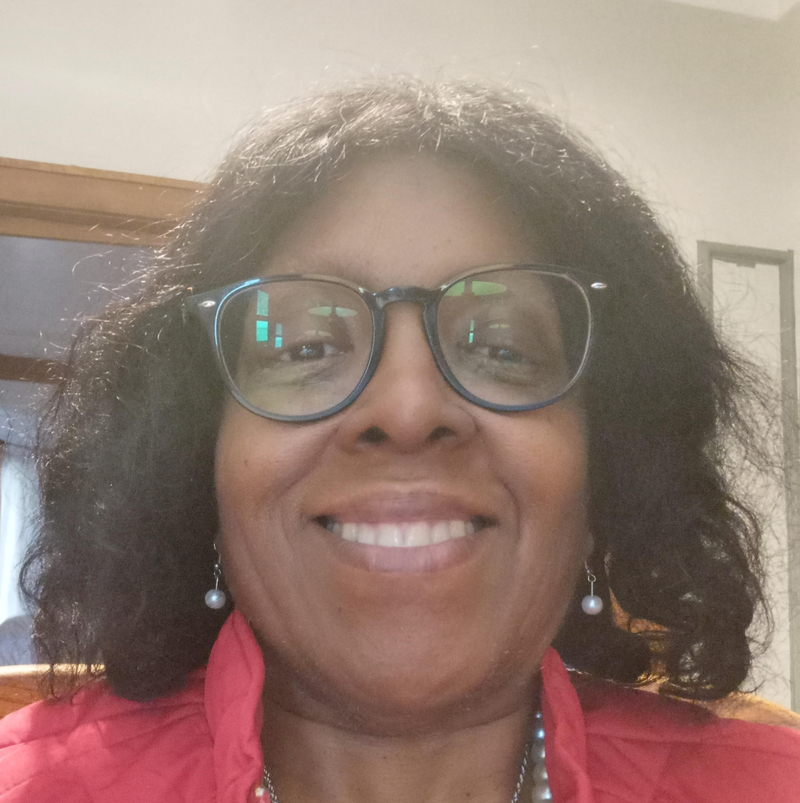
Shawnee Daniels-Sykes On the Roles, Faith, Socioeconomic Status, Race & Attitude Play in a Pancreatic Cancer Journey
Written By Julia Brabant
May 2021
Date of Diagnosis: Late November, 2019
Status: Stage 4 Pancreatic Cancer – Stable
Shawnee Daniels-Sykes, RN, PhD, had high hopes for the year ahead as 2019 came to a close, and she planned to kick things off by swimming 20 laps to ring in 2020. Things took a turn right before Thanksgiving, though, and so, too, did Shawnee’s plans for the weeks, months and year to come.
Shawnee was working her way up to swimming 20 laps at a time when, in the pool one day, she began experiencing excruciating pain. She was no stranger to abdominal pain, having dealt with Crohn’s disease for the past 35 years. Yet, this pain was noticeably different. When her Crohn’s disease acted up, she felt it in the lower right quadrant of her abdomen. This time, her pain was most severe closer to her heart.
In addition to the pain, Shawnee’s younger brother commented that she’d been losing noticeable weight. Concerned the weight loss might be the result of cancer, he urged her to seek medical care. Taking his advice, Shawnee went to the nearest emergency room. When it was full, she sought treatment at a different hospital, where she underwent a CT scan.
“I have terrible news,” the ER doctor said upon reentering the room. “You have Stage 4 pancreatic cancer.”
There, she connected with a team of physicians and health care professionals including hematologist and oncologist Dr. Ben George, M.D., surgical oncologist Dr. Kathleen Christians, M.D., radiation oncologist William Hall, M.D., and Physician’s Assistant Susan Stolz.
“I felt very well taken care of right off the bat,” she said, noting the difference in treatment from the first hospital and how much more comfortable she felt in this new environment. “The care I received there was excellent.”
Due to her preexisting health issues and past surgeries for gastrointestinal issues, doctors at Froedtert determined Shawnee was not a good candidate for surgery or radiation. She began an intensive chemotherapy regimen that continued until December of 2020. She then transitioned to a second chemotherapy regimen that required her to have chemo at the hospital and then additional treatments at home over the weekend using an infusion pump.
While she has experienced mild neuropathy in her feet as a result of the chemo, she feels lucky to have had minimal pain. She feels full of energy, and she continues to serve as a university professor, which is something she credits both her employer, Mount Mary University in Milwaukee, and her medical team with helping her do.
“I’m very blessed in that I can still be a professor – the university and Dr. George and his team have been great about staying flexible and working around my schedule,” Shawnee said. She also noted that she teaches, lectures and delivers presentations online, which has made things easier.
Shawnee also feels blessed to have the financial resources needed to secure quality care and undergo chemotherapy, noting how expensive chemo can be. She is also well aware of the health disparities that exist when it comes to cancer treatment and care, noting that African Americans face higher incidence and death rates of pancreatic cancer and many other types of cancer.
According to the National Cancer Institute, the rate of new cases of pancreatic cancer shows the rate of White Males is 15.2 per 100,000 versus 17.0 per 100,000 Black Males. In females the rate is 11.7 for White Females versus 14.3 per 100,000 for Black Females.
According to Johns Hopkins Medicine:
“The incidence of pancreatic cancer is higher in African Americans than in any other racial group on the United States.” The age-adjusted rate for Blacks is 15.9 “per 100,000 people incidence rate. while for Whites it is 13.4 per 100,000 people. Per capita, pancreatic cancer is more common among African Americans and are also more often diagnosed with advanced stage pancreatic cancer. African Americans are less likely to receive surgery versus any other racial group in America. And the age-adjusted mortality rate for Blacks is 13.3 per 100,000 people, while for Whites it is 11.0 per 100,000 people.
Social Economics Status (SES)
Low SES has consistently been implicated as a risk factor for many of these problems that plague communities. Research indicates that there are large health disparities based on social status that are pervasive and persistent. These health disparities reflect the inequalities that exist in our society. It is important to understand how various social statuses intersect because race and socioeconomic status affect health exclusively as well as mutually.
Read This Study: “Ethnic and Racial Minorities & Socioeconomic Status”
This could be due to a number of factors, including a higher incidence of diabetes among Blacks, a larger number of Blacks who smoke, and disparities in terms of education and access to health care, among others. What is less clear, however, is how hospitals and health care systems can work to eliminate these disparities and ensure equal access to quality health care for all.
While African Americans have higher incidence and death rates for pancreatic cancer, they also have the worst prognosis for the disease of any racial group.
While Shawnee recognizes the significant roles race and socioeconomic status play in a cancer journey, she notes that attitude, too, goes a long way.
“With a diagnosis as lethal as mine was, you have to keep a positive attitude and a desire to fight,” she said. “You can’t just lay down and die.”
These days, Shawnee maintains that desire to fight as she continues chemo and manages her Type 2 diabetes, which she dealt with on and off before her pancreatic cancer diagnosis as her glucose levels moved in and out of normal ranges. She now watches her carbohydrate intake closely, avoids most processed foods and meets with a diabetes counselor every six weeks to help regulate her glucose levels. She also takes Vitamin D supplements and antioxidants, practices yoga and undergoes acupuncture, which she says helps with pain, relaxation and clear thinking. She’s also planning to get back in the pool again as soon as COVID-19 risks and restrictions ease up.
Shawnee also underwent genetic testing to see if she had any predispositions to pancreatic cancer, or cancer in general. Her tests didn’t reveal any such predispositions. She now returns to Froedtert periodically for follow-up scans and checkups, and she also meets with a virtual prayer group several times a month to help keep her spirits high.
“There’s a lot of energy that comes through faith. It’s important to surround yourself with people who want to walk with you and support you on this journey,” she said. “It doesn’t have to be a death sentence.”




Thank you for your story
Lets support each other
I am in early stages –
I will try to contact u thru social media .. Love & blessings & prayers